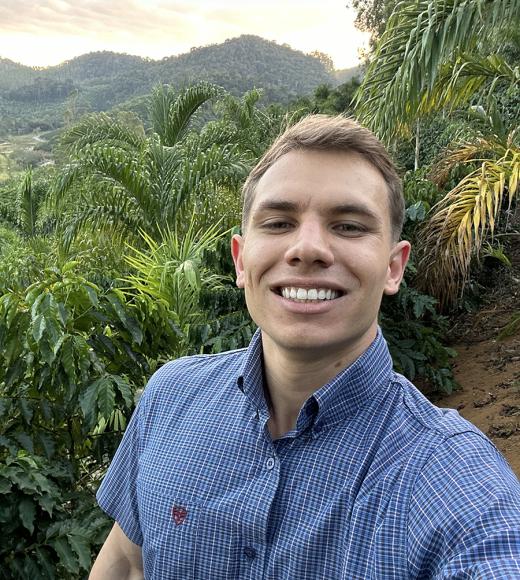How Graduate Student Willian Klippel-Huber Connects His Brazilian Roots to New Research

For Willian Klippel-Huber, who recently began his Master of Science degree in biological systems engineering at the University of California, Davis, the research he is embarking on will directly impact his hometown.
Klippel-Huber grew up on a coffee farm in Marechal Floriano, Espirito Santo, Brazil. When he was younger, he would help with producing coffee seedlings and pruning, since they were tasks that could be done in tandem with school.
"As a teenager, I started taking on more responsibilities like managing the fields, creating budgets and even helping to start and run a coffee roasting facility on the farm," said Klippel-Huber. "Growing up on the farm shaped my problem-solving skills and fueled my curiosity about how things work. This naturally influenced my decision to pursue engineering in college, combining my love for agriculture with technology."
Researching a Better Bean
Now at the UC Davis Coffee Center, a center of excellence in the College of Engineering, Klippel-Huber will study Brazilian coffee bean defects with the aim of providing scientific knowledge to support fair trade and improve market practices for coffee growers worldwide, including those in his home community.
"We will research defective coffee samples to analyze how every defect and its quantity present within it affects the final taste of a cup of coffee," said Klippel-Huber. "We want to see how exactly those defects affect the taste of coffee when it comes to the flavors."
With Klippel-Huber's research, coffee farmers and coffee trading companies will be able to tell what a cup of coffee will taste like before it is even brewed and understand how each defect and its degree in the green coffee beans can affect the quality of the cup. This research is particularly important for farms like the one Klippel-Huber grew up on because the coffee beans and their taste are what impact their sales.
First, the different types of defects in the beans must be sorted; Klippel-Huber will do this manually, following the traditional methods of the coffee trading process. Klippel-Huber will also conduct experiments, including brewing and tasting the coffee to better understand the influence of each defect, and carry out a literature review of a defect table that was created by Brazilian coffee growers, likely in the 19th century. (One of the objects of the literature review is to find the exact origin of the table.)
With the newer resources at the Coffee Center, including environmental chambers and freezers designed to house coffee bean samples, top-of-the-line coffee roasters and the sensory room, Klippel-Huber can now build from that early research.
"The research of coffee didn't start right now at UC Davis," said Klippel-Huber, who is excited to take advantage of all the Coffee Center, as the first research and teaching facility in the U.S. entirely dedicated to coffee, has to offer to take coffee research to the next level. "It's been a long journey and now this research is starting to be bigger and bigger."


Finding a Home Away from Home
Klippel-Huber began his journey at UC Davis before the start of his master's degree. In the winter quarter of 2023, when Klippel-Huber was still an undergraduate student at the Federal University of Viçosa, he came to UC Davis for an internship with Irwin R. Donis-González, an assistant professor of cooperative extension in biological and agricultural engineering, to research non-invasive techniques of assessing the quality of green coffee beans.
"When I arrived in Davis I saw the facilities and how great the infrastructure is," said Klippel-Huber.
Not only has Klippel-Huber felt supported by the Coffee Center in his research but he has also found financial, academic and community support from university resources.
As part of the Graduate Mentoring Initiative, Klippel-Huber is paired with an older graduate student to whom he can talk about challenges he is facing personally or in his research.
Through the program, Klippel-Huber has been pointed toward resources that are particularly helpful for international students like The Pantry, where Klippel-Huber can get affordable food and household essentials, easing his transition to life in Davis, and the English classes through Global Affairs, which has helped him improve his communication skills, connect with new people and feel more confident sharing his ideas with his peers and professors.
Applying the Research Back at Home
As much as Klippel-Huber is finding a community here at UC Davis, he looks forward to bringing his newfound knowledge to help his community back at home.
"I was born and raised on the farm, so I know how difficult it is to be a farmer," said Klippel-Huber. "I'm hoping to go back to Brazil and help them produce the best coffee beans more efficiently and sustainably and make their lives better."
